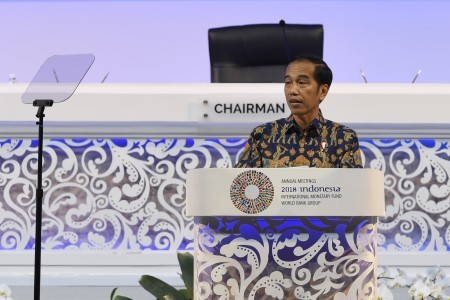Jokowi ratifies seven trade agreements
Jokowi, who is seeking reelection next year, appears to show a pro-international trade stance.
Change Size
 President Joko “Jokowi” Widodo delivers his speech at the IMF-World Bank Annual Meeting in Nusa Dua, Bali, on Oct. 12. (Antara/Puspa Perwitasari)
President Joko “Jokowi” Widodo delivers his speech at the IMF-World Bank Annual Meeting in Nusa Dua, Bali, on Oct. 12. (Antara/Puspa Perwitasari)
P
resident Joko “Jokowi” Widodo has ratified seven bilateral and multilateral trade agreements by signing a presidential regulation in a bid to boost trade, according to a senior trade official.
Trade Ministry secretary-general Karyanto Suprih confirmed on Tuesday that he had been informed about the ratification.
“This morning, I heard that the President had signed a presidential regulation regarding the ratification of the deals [...] The only thing left to do is to forward the regulation to the Law and Human Rights Ministry to have it promulgated,” Karyanto said at a press gathering on Tuesday.
The news about the ratification broke out less than a week after a group of Cabinet ministers agreed to accelerate the aforementioned agreements in a meeting led by Coordinating Economic Minister Darmin Nasution.
The ratified agreements, which include free trade agreements (FTAs), are the ASEAN-Australia-New Zealand FTA (AANZFTA), ASEAN-India FTA (AITISA), ASEAN-Korea FTA, ASEAN-China FTA, ASEAN agreement on medical device directive, the ninth protocol of the ASEAN framework agreement on services and the Indonesia-Pakistan preferential trade agreement (IP-PTA).
Karyanto reaffirmed that the President’s move was in accordance with Article 84 of Law No. 7/2014 on international trade agreements, which stipulates that the executive is authorized to ratify an agreement if the House of Representatives as the legislative body fails to make a decision within 60 working days after the agreements are signed.
All of the aforementioned agreements have surpassed the 60-day period. Since 2015, several pacts, such as the first protocol to amend the AANZFTA and agreement on trade in services under the AITISA, have been proposed by the government to the House to be ratified into law.
Jokowi, who is seeking reelection next year, appears to show a pro-international trade stance, which he implied in his speech during the plenary session of the Annual Meetings of the International Monetary Fund and World Bank Group in October of the importance of stronger global cooperation against rising protectionism.
However, at the same time, Jokowi has on many occasions called for the safeguarding of domestic interests, such as by nationalizing oil and gas assets and acquiring the majority ownership of the Grasberg mine from United States company Freeport-McMoRan.
The cost of not ratifying the seven agreements was high, according to the government. For example, not ratifying the latest protocol of the IP-PTA would have automatically terminated the agreement, closing access to the US$1.46 billion crude palm oil (CPO) market in Pakistan at a time when neighboring CPO producer Malaysia is seeking to upgrade bilateral trade ties with Pakistan.
Meanwhile, not ratifying the latest protocol of the AANZFTA will mean that Indonesian products exported to Australia or New Zealand will not benefit from preferential tariffs under the pact, effectively putting a barrier up to exported goods worth $1.76 billion.
When The Jakarta Post requested comment, Presidential spokesperson Johan Budi said in a text message that he would check on the information.
Responding to the news, Indonesian Employers Association chairman Hariyadi Sukamdani said the business community welcomed the ratification as it would bring them opportunities to balance out trade transactions with the countries involved in the agreements.
For example, through the AANZFTA, Indonesia would be able to export consumer goods to Australia with the advantage of lowered import tariffs, with which Indonesia has been recording a trade deficit, whereas Indonesia would maintain its import of raw materials, such as salt and wheat, from Australia.
“The ratified agreements had considerably less challenges compared to the other ongoing talks, such as the Indonesia-European Union Comprehensive Economic Partnership Agreement,” Hariyadi told The Jakarta Post on the sidelines of a seminar on Tuesday. “With opened markets, their import tariffs will also be lowered.”
He reminded that businesses, as well as the government, should also be prepared by improving the quality of exported commodities and policies.
“Do not leave our exports under prepared when the market is ready,” he added.










